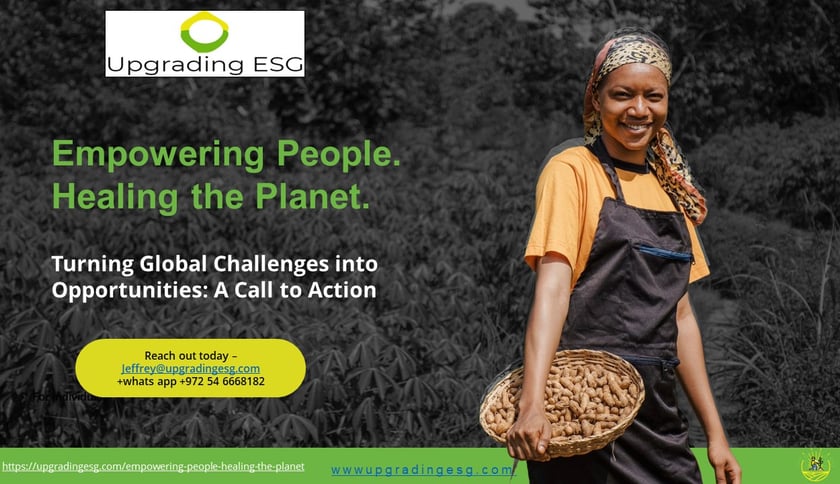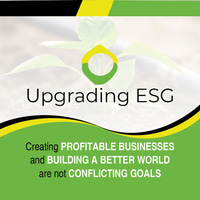Turning Global Challenges into Opportunities: A Call to Action
Empowering People. Healing the Planet.


Introduction
In our interconnected world, the constant stream of news and articles often portrays a grim picture of the challenges our planet faces. Whether it's the environmental impact of salmon farming, the widespread use of pesticides in our food system, or the shocking statistics on food loss in agriculture, it's easy to feel overwhelmed by the magnitude of these global issues. However, amidst these challenges, there lies a glimmer of hope and potential for positive change.
Salmon Farming in Norway
An Environmental Tale: Salmon farming, once seen as a solution to overfishing, has exposed its own environmental concerns in Norway. Crowded fish pens and antibiotic use raise questions about water pollution and disease transmission to wild salmon populations. While this paints a bleak picture, it underscores the necessity of sustainable practices and responsible aquaculture techniques.
Pesticides in Our Food System
Approaching a Crisis: Excessive pesticide use in our food system is a growing concern. These chemicals, designed to protect crops, often find their way into our food and water sources, posing significant risks to human health and the environment. Addressing this issue calls for stricter regulations and a shift towards sustainable, organic farming practices.
Food Loss: A Global Epidemic
The alarming reality of food loss in agriculture demands our immediate attention. Approximately one-third of all globally produced food is lost or wasted each year, impacting food security, economics, and the environment. A comprehensive strategy is essential to reduce post-harvest losses and empower farmers across the food value chain.
The Size of Post-Harvest Loss:
One-third of all food produced globally is lost annually.
This loss incurs an annual cost of USD 2.6 trillion, including USD 700 billion in environmental costs and USD 900 billion in social costs.
In sub-Saharan Africa, 37% of food produced is lost between production and consumption.
The annual value of post-harvest grain loss in sub-Saharan Africa is USD 4 billion, exceeding the total food aid received over the past decade.
(Sources: Food and Agriculture Organization, FAO, 2019 | World Bank Group, Agriculture in Africa: Telling Myths from Facts, 2018)
A Glimpse of Hope
The YieldWise Initiative in Kenya: The Rockefeller Foundation's YieldWise Initiative shines as a beacon of hope. Focused on reducing post-harvest losses, it addresses a critical issue, especially in sub-Saharan Africa, where 37% of food is lost. YieldWise employs a four-pronged strategy encompassing training, technology access, market access, and financial support. indeed, this is a blueprint of the required model to effect change.
Leading the Charge
Dream Valley Global, a for-profit company, stands at the forefront of addressing these challenges . Their commitment to assisting farmers in maximizing fruit production, minimizing losses, and enhancing profitability offers a promising path forward. By championing tailored solutions and sustainable practices, they exemplify the change needed in the agricultural industry.
Turning Words into Action
While the world's challenges may seem daunting, they also present opportunities for positive transformation. Whether addressing environmental concerns in salmon farming, reducing pesticide use in agriculture, or combating food loss, organisations and initiatives are dedicated to making a difference. As we learn about these issues and absorb the staggering statistics, let's remember that even small actions can contribute to meaningful change.
Day of Judgment
In Judaism, Rosh Hashanah, the New Year, is humanity's Day of Judgment. Every action is scrutinised on this day, and the coming year's events are recorded. Looking at the statistics, humanity finds itself at a crossroads. It's a time for deep reflection, particularly considering that many challenges and solutions can be found in the global south.
The UN has published the first "global stocktake" to examine the efforts of countries to reduce planet-warming emissions since the Paris Agreement. The results are depressing,
https://unfccc.int/topics/global-stocktake
A Time for Reflection: Bridging the Investment Gap in Africa
Africa Climate Week (ACW 2023) was orchestrated by the United Nations Framework Convention on Climate Change (UNFCCC), the United Nations Development Programme (UNDP), the United Nations Environment Programme (UNEP), and the World Bank, with unwavering support from regional partners such as the African Union (AU), the United Nations Economic Commission for Africa (ECA), and the African Development Bank (AfDB).
During this event, one of the most eagerly anticipated developments was the commitment from investors in the United Arab Emirates (UAE) to purchase $450 million worth of carbon credits from the Africa Carbon Markets Initiative (ACMI), a venture inaugurated at Egypt's COP27 summit last year.
Africa is at a crossroads, possessing 40% of the world's workforce by 2100 and two-thirds of the globe's uncultivated arable land. This vast potential can revolutionise smart agriculture and carbon sequestration on a global scale. However, focusing solely on carbon credits falls short of addressing our multifaceted challenges.
In the sphere of investments, especially regarding energy generation funded through carbon credits, it's imperative to comprehensively address the existing gap. The current approach lacks the transformative impact required. Enter Agro Offsets, driven by the innovative concepts of FarmUp. This visionary initiative prioritises farming projects to increase farmer incomes, thereby establishing an economic foundation for affordable housing and renewable energy.
Real-World Pioneers
To illustrate the tangible impact of this approach, let's delve into the journeys of real-life entrepreneurs and farmers striving to secure financial investments in Africa and many other developing regions:
Edina from Zambia: Urban farmers in Zambia require substantial support, especially in combating threats like fruit flies that devastate crops, even affecting commercial mango farmers.
Atwongyeire from Uganda: The founder of Billion Trees Uganda Limited, Joseph, endeavours to reforest parts of western Uganda with one million trees, a remarkable contribution to saving our planet.
Joseph from Cameroon: Joseph seeks funding to upgrade farms in his village, a project that promises to create 400 direct jobs in agriculture by cultivating 5000 hectares of corn and soybeans on the vast savannahs available in their communities.
Geraldo from Brazil: Geraldo's mission is to empower farmers in the Amazon rainforest, offering hope for local livelihoods and global environmental conservation.
These entrepreneurs and farmers embody the driving force behind impactful projects addressing poverty, environmental concerns, and sustainable development.
Africa Climate Week 2023: A Pivotal Event
The recent Africa Climate Week 2023 (ACW 2023) showcased Africa's growing commitment to climate action. With its four thematic tracks, ACW 2023 delved into various aspects of climate resilience, urban development, land use, and societal well-being.
Notable commitments emerged during this event, underscoring Africa's pivotal role in global climate solutions. The commitment of investors from the UAE to invest $450 million in carbon credits through the Africa Carbon Markets Initiative reflects the increasing interest in climate financing and Africa's significance in shaping climate solutions.
The challenge is to harvest the energy into real-world investment and impact.
The Game-Changer: Agro Offsets
Major corporations, including tech giants, telecom companies, supermarkets, mining firms, and oil and gas giants, have the potential to spark transformative change in the regions they engage with. This is where Agro Offsets come into play. It's not merely about offsetting carbon emissions; it's about making tangible, positive impacts. Agro Offsets hold tremendous potential in terms of carbon-saving, waste reduction, environmental preservation, and improved living standards.
Introducing FarmUp: Where Transformation Begins
Our vision takes shape through FarmUp, a platform that catalyses change in developing nations. FarmUp focuses on financial inclusion, economic upliftment for farmers, and environmental sustainability. This platform revolves around four pillars:
Urban Farming Transformation: Empowering urban farmers with advanced agricultural technology, water efficiency, and comprehensive farming services.
Solar Agro Adoption: Combining agriculture with solar energy to create a powerful synergy that promotes prosperity and sustainability.
Mango Industry Upgradation: Addressing unique challenges in the mango industry, a cornerstone for economic growth in many African countries.
Eco-Village Creation: Transforming villages into self-sustaining, eco-friendly havens by utilising innovative adobe housing solutions.
FarmUP: A Platform for Change
FarmUP is a groundbreaking digital farming project marketplace that fosters sustainable investment in agroecology, particularly in Africa, home to numerous small-scale farmers. This platform bridges corporate social responsibility and agro offsets by offering tailored project opportunities that drive positive change. It provides finance, farm tech, services, and FinTech solutions to ensure transparency and accountability.
Blended Finance: Bridging the Gap for Impactful Change
Despite high-level pledges and commitments, a significant gap exists between available capital and its deployment into critical projects. Drawing inspiration from Gillian Marcelle's Triple B Framework, which leverages capital as a catalyst for change, I share some of her approach, which centres on “three pivotal themes:
Bottlenecks: Identifying and addressing barriers that hinder the mobilisation and deployment of capital, encompassing structural, processual, and cognitive challenges.
Blind Spots: Acknowledging the cognitive blind spots that emerge from human behaviour and attitudes, particularly "groupthink" stemming from a lack of diversity.
Blended Finance: Embracing blended finance as an investment approach that combines financial capital with diverse forms of capital, such as knowledge, social, cultural, relationship, network, and political assets, using systematic processes.”
A Call to Action: Unite for Change
Now, let's explore how collective contributions, diversified investments, and inclusive funding sources can amplify the impact of blended finance:
The Power of Collective Contribution: A fundamental question arises: Can a modest $10 monthly contribution truly make a difference? The answer lies in the concept of people power. When a million concerned individuals unite with the shared goal of effecting change, their combined contributions amount to a staggering $100 million annually. When coupled with contributions from affluent individuals and companies, this collective force can be a catalyst for positive change and significant impact. Whether one is a dreamer or deemed naive, the potential of such a movement is compelling and worth exploring.
Aggregating Investments for Diversification: To maximize the impact of these contributions, one practical approach is the aggregation of investments into an Agro Offset Fund. This fund would diversify investments across a spectrum of projects, encompassing those that may not yield immediate financial returns to those with the potential for profitability.
Inclusive Funding Sources: The sourcing of these funds should be inclusive, ranging from concerned individuals making simple monthly contributions to Agro (as an alternative to carbon offsets), to participation from wealthy individuals, companies, and, potentially, government agencies. Collaboration among these diverse stakeholders holds the key to driving meaningful change and impact.
In conclusion, the concept of blended finance offers a promising path to bridge the gap between available capital and its deployment into projects with the potential to address pressing global challenges. We can embark on a journey towards positive transformation and lasting impact by harnessing collective contributions, diversifying investments, and fostering inclusive funding sources.
Translating Pledges into Action: The Role of Platforms like FarmUp
While high-level pledges and commitments are significant, it's crucial to ensure that these investments materialise into projects where they are most needed. This requires a collective effort involving individuals, governments, companies, farming associations, financial institutions, and banks.
Platforms like FarmUp can play a pivotal role in facilitating these efforts. They offer transparency, agricultural expertise, and a means to connect investors with impactful projects. By franchising platforms like FarmUp across various countries, we can bridge the gap between climate pledges and on-ground actions.
In conclusion, Agro Offsets and platforms like FarmUp present compelling opportunities to align investments with poverty reduction, food security, and environmental preservation. It's time to turn words into actions and work collectively to create a more sustainable future for all.
Join us today in transforming the world, one Agro Offset at a time. Together, we can make a real difference.
